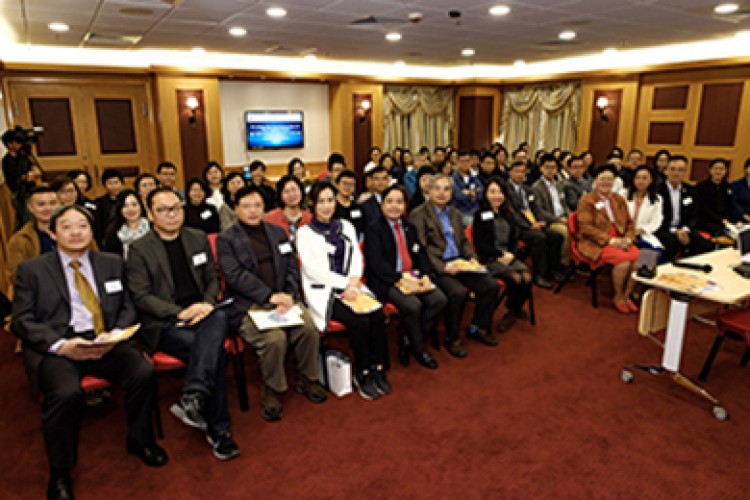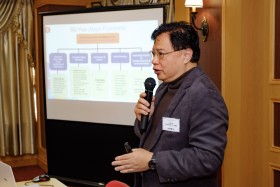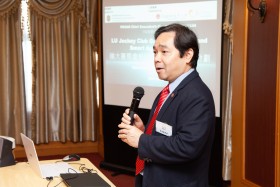Lingnan University to build a 2,000 sq ft lab and cloud platform to boost gerontechnology
Like other international cities, Hong Kong is facing the challenges of an ageing population, as well as changes in the way people live brought about in large part by advances in technology.
A key question, though, is whether technology can play a bigger role in improving the quality of life of older people and who should be taking the lead to make it happen.
Recently, Lingnan University was nominated on the Chief Executive’s Community Project List and granted close to HK$20 million by The Hong Kong Jockey Club to run a pilot project in this respect. Known as the “LU Jockey Club Gerontechnology and Smart Ageing” initiative, the aim is to demonstrate how technology can improve healthcare, meals, day-to-day living conditions and transportation for the elderly and help them adapt to the changes taking place in society at large.
The three-year project also aims to train young professionals for the sector to overcome the current labour shortage.
2,000-sq ft Gerontech-X Lab to showcase latest products
To this end, Lingnan University is teaming up with the government, businesses, social services, healthcare providers and others to launch a wide array of initiatives. These will include technology applications, education, and an online platform for social enterprises and start-ups. Establishing the “Gerontech-X Lab” on the Lingnan campus in Tuen Mun is an important step. It will be the first lab of its kind in the New Territories West area, with indoor and outdoor facilities covering a total of 2,000 sq ft.
“The lab will allow the general public to try out various gerontechnology products on the spot,” project manager Chloe Siu told attendees at a special briefing session in February. “In turn, the elderly can give feedback to carers and exhibitors about the different products. Their user experience will help in addressing actual needs. The lab will be educational, letting visitors learn what is available on the market and how to use each item in the home.”
Construction of the lab is set to start in July, and it will open to public in October this year. Initially, more than 40 of latest gerontechnology products are expected to be on show.
“This is not an experiment, but a real, measurable initiative,” said Prof Joshua Mok, vice-president of Lingnan University and the project’s inspector. “It is all about synergy and collaboration. We need professional advice and guidelines from technology and healthcare experts to help frontline workers, carers and students to understand gerontechnology and its applications, and how they can benefit the elderly.”
Prof Mok obviously hopes that, in due course, the project will extend well beyond Tuen Mun to other districts in Hong Kong.
Big data platform for social enterprises
In addition, there will be a “Social Enterprise Intelligent Hub” (SEI) making use of big data analytics in innovative ways with the support of relevant partners.
Rosiah Ho, project co-inspector, explained that it will be a cloud-based resource information platform. The aim is to gather helpful data from social enterprises across in Hong Kong relating to start-ups, recent research and successful outcomes. This will help to facilitate collaboration, innovation, and even financing.
“Launching this is a response to the weak existing ecosystem for social enterprises in Hong Kong,” Ho said. “There is general lack of information flow and communication, which is the key factor in the slow pace of development of social enterprises locally.”
By deploying big data analytics, the SEI also plans to perform behavioural monitoring.
“All activities on the platform will be recorded,” Ho said. “We will then know which are the most-viewed products and technology and which courses users are most interested in. That will help in understanding which innovations are worth investing in.”
He added that vendors on the platform will generally be world-class multinationals. At this stage, the objective is to get over 90 per cent of the social enterprises and NGOs in Hong Kong using the platform within four years, and to make it the place where buyers and sellers connect. Further ahead, it might be developed as a fund-raising platform with full supply-chain services.
Vocational courses to attract new workforce
According to Siu, the overall project will also include a series of educational programmes, public seminars, and community outreach events.
“We have plans to host an international conference on gerontechnology and ‘socialpreneurship’ in 2020, giving practitioners and researchers from around the world the opportunity to share ideas and research findings,” Siu said.
In addition, Lingnan intends to set up a research centre to assess the operating conditions, problems, needs and wants of social enterprises in Hong Kong. The findings may well give policymakers a whole new perspective on what elderly people and those who care for them now require.
Regarding the shortage of qualified professionals, Lingnan will launch two certificate courses. One is Gerontechnology for Healthcare, Dining, Living and Transport. The other will focus on Socialpreneur Incubation.
“The former offers practical training workshops for young people, frontline staff, care-givers and elderly ambassadors to raise awareness about gerontechnology,” Siu said. “It will also look at relevant policies and practice to keep them abreast of the latest developments.”
On completing the course, graduates may be offered employment at the Gen-X Hub.
Those who want to start their own business or social enterprise should consider the incubation course. It will give them essential management know-how in everything from writing a business proposal to pitching, organising finances, and marketing.
Welcoming partners to achieve shared economy
Prof Mok reaffirmed that the project is a synergy between government, business, the education sector and the general public, all of whom will play their part.
“Government and funding support are essential, yet without the joint efforts of all our partners, we could not achieve the real benefits we want to for elderly people in Hong Kong,” he said.
He added that Lingnan University welcomes the involvement of any local or regional organisations or individuals who can help the promotion and adoption of gerontechnology in the community at large, and expressed his appreciation for the support of current partners including Smart City Consortium.
“Elderly people have made a significant contribution to society. It is now our responsibility to provide them with better care and a good living environment in their later years,” he said.





